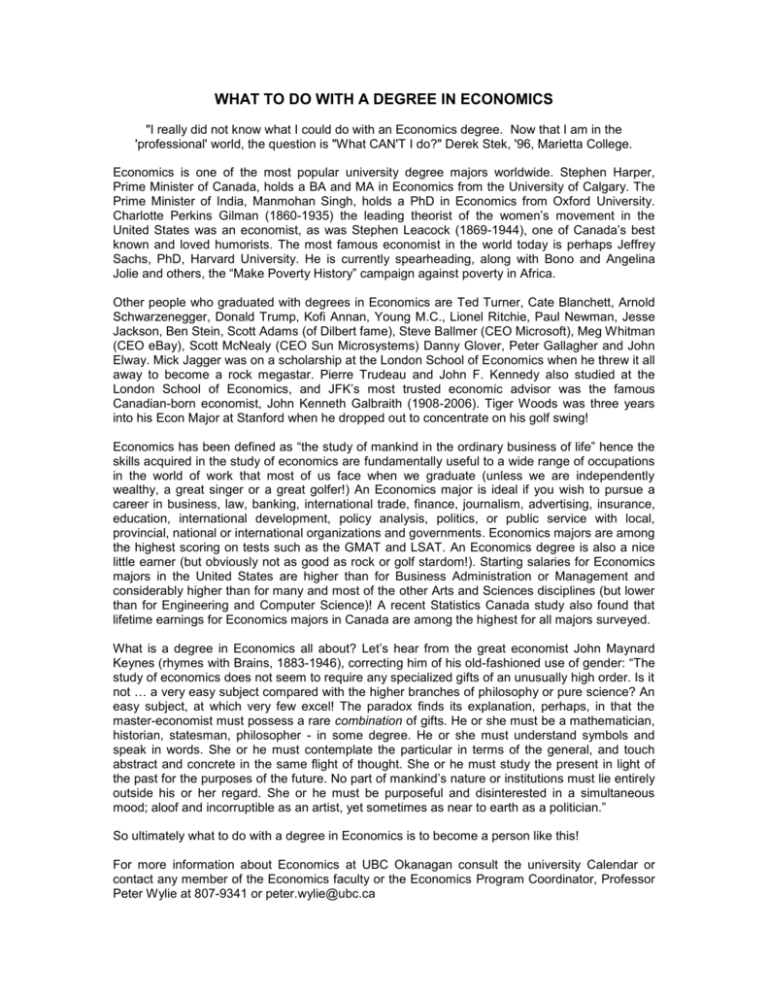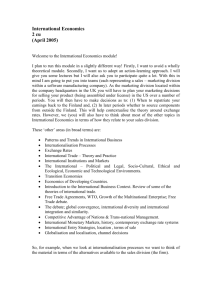WHAT DO I DO WITH A HISTORY DEGREE
advertisement

WHAT TO DO WITH A DEGREE IN ECONOMICS "I really did not know what I could do with an Economics degree. Now that I am in the 'professional' world, the question is "What CAN'T I do?" Derek Stek, '96, Marietta College. Economics is one of the most popular university degree majors worldwide. Stephen Harper, Prime Minister of Canada, holds a BA and MA in Economics from the University of Calgary. The Prime Minister of India, Manmohan Singh, holds a PhD in Economics from Oxford University. Charlotte Perkins Gilman (1860-1935) the leading theorist of the women’s movement in the United States was an economist, as was Stephen Leacock (1869-1944), one of Canada’s best known and loved humorists. The most famous economist in the world today is perhaps Jeffrey Sachs, PhD, Harvard University. He is currently spearheading, along with Bono and Angelina Jolie and others, the “Make Poverty History” campaign against poverty in Africa. Other people who graduated with degrees in Economics are Ted Turner, Cate Blanchett, Arnold Schwarzenegger, Donald Trump, Kofi Annan, Young M.C., Lionel Ritchie, Paul Newman, Jesse Jackson, Ben Stein, Scott Adams (of Dilbert fame), Steve Ballmer (CEO Microsoft), Meg Whitman (CEO eBay), Scott McNealy (CEO Sun Microsystems) Danny Glover, Peter Gallagher and John Elway. Mick Jagger was on a scholarship at the London School of Economics when he threw it all away to become a rock megastar. Pierre Trudeau and John F. Kennedy also studied at the London School of Economics, and JFK’s most trusted economic advisor was the famous Canadian-born economist, John Kenneth Galbraith (1908-2006). Tiger Woods was three years into his Econ Major at Stanford when he dropped out to concentrate on his golf swing! Economics has been defined as “the study of mankind in the ordinary business of life” hence the skills acquired in the study of economics are fundamentally useful to a wide range of occupations in the world of work that most of us face when we graduate (unless we are independently wealthy, a great singer or a great golfer!) An Economics major is ideal if you wish to pursue a career in business, law, banking, international trade, finance, journalism, advertising, insurance, education, international development, policy analysis, politics, or public service with local, provincial, national or international organizations and governments. Economics majors are among the highest scoring on tests such as the GMAT and LSAT. An Economics degree is also a nice little earner (but obviously not as good as rock or golf stardom!). Starting salaries for Economics majors in the United States are higher than for Business Administration or Management and considerably higher than for many and most of the other Arts and Sciences disciplines (but lower than for Engineering and Computer Science)! A recent Statistics Canada study also found that lifetime earnings for Economics majors in Canada are among the highest for all majors surveyed. What is a degree in Economics all about? Let’s hear from the great economist John Maynard Keynes (rhymes with Brains, 1883-1946), correcting him of his old-fashioned use of gender: “The study of economics does not seem to require any specialized gifts of an unusually high order. Is it not … a very easy subject compared with the higher branches of philosophy or pure science? An easy subject, at which very few excel! The paradox finds its explanation, perhaps, in that the master-economist must possess a rare combination of gifts. He or she must be a mathematician, historian, statesman, philosopher - in some degree. He or she must understand symbols and speak in words. She or he must contemplate the particular in terms of the general, and touch abstract and concrete in the same flight of thought. She or he must study the present in light of the past for the purposes of the future. No part of mankind’s nature or institutions must lie entirely outside his or her regard. She or he must be purposeful and disinterested in a simultaneous mood; aloof and incorruptible as an artist, yet sometimes as near to earth as a politician.” So ultimately what to do with a degree in Economics is to become a person like this! For more information about Economics at UBC Okanagan consult the university Calendar or contact any member of the Economics faculty or the Economics Program Coordinator, Professor Peter Wylie at 807-9341 or peter.wylie@ubc.ca








